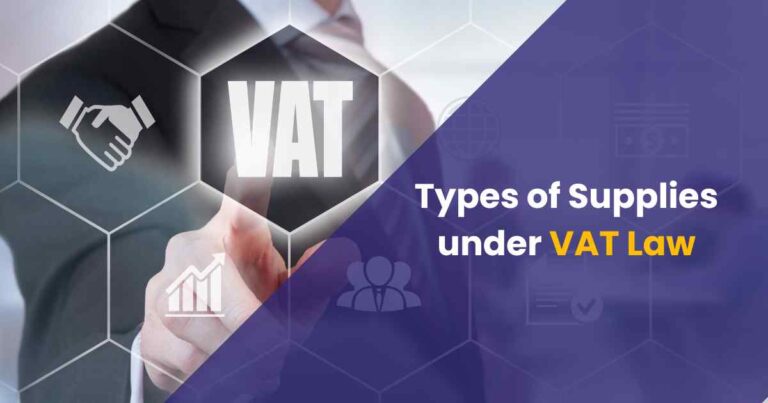The United Arab Emirates (UAE) introduced a value-added tax system in 2018 under Federal Decree-Law No. 8 of 2017. This 5% VAT applies on the purchase of certain goods and services in the country. However, not all products and services are treated the same when it comes to VAT.
There are a few main categories of supplies recognized under the UAE’s VAT rules. It is important for both consumers and businesses residing here to understand what they are. This article will explain the key types – standard rated, zero rated, exempt, and out of scope supplies – in an easy-to-grasp way.
Firstly, what does the term “supplies” actually mean in this VAT context? Simply put, it refers to the goods or services that are sold by a business to customers. Every supply will fall under one of the aforesaid four supply classifications, depending on factors like necessity and potential societal impact.
Now, let us look at each category of supply in detail along with common examples for better understanding:
Standard Rated Supplies
Standard rated supplies refer to products and services on which 5% VAT is levied at the point of sale. In other words, consumers have to pay an extra 5% tax when purchasing such supplies from businesses. Some common instances are:
- Clothing and footwear
- Electronics like laptops, mobiles, televisions
- Furniture and home appliances
- Hotel accommodation
- Fast food and restaurant meals
- Stationery like pens, paper, folders
- Personal care items like skincare, cosmetics
- Pet food and accessories
When you go to a retail store or supermarket, you must have noticed the shelf price label showing two prices – one before VAT and one after. This means it is a standard rated supply with VAT added on top at billing time. Out of all supply types, majority fall under this standard rated bracket.
Now who collects this 5% VAT and why? Well, it is the responsibility of the retailers and service providers to collect the tax from customers on behalf of the UAE government. Part of collections go towards paying suppliers and vendors, while the surplus amount gets deposited to the Federal Tax Authority. This mechanism helps fund infrastructure and public service initiatives for the country.
Zero Rated Supplies
Zero rated supplies refer to essential goods and services that have a 0% tax rate under VAT rules in the UAE. Hence, no additional VAT gets added to the price that consumers have to pay for such supplies. Some foremost instances are:
- Basic food ingredients like rice, sugar, salt, flour, lentils, grains
- Fruits, vegetables, meat, fish, eggs and dairy
- Medicines and pharmaceuticals
- Healthcare and medical treatment
- Education including school and university fees
- Local public transport
- Oil, gas and their derivatives
- First supply of gold, diamond and platinum
International export of goods and services from the UAE are also zero rated. Though VAT is not charged on such supplies, businesses can still claim refunds on VAT they paid when sourcing from suppliers. This avoids double taxation and improves sector competitiveness.
VAT Exempt Supplies
VAT exemption is the third category of supplies under Federal Decree-Law No. 8. When something is VAT exempt, it indicates that no tax can be charged on the supply. Certain financial services, buying/renting residential property, and passenger transport are commonly exempt.
However, there is a key difference between zero rated and exempt supplies. While businesses making zero rated supplies can reclaim VAT amount borne on expenses, those making exempt supplies cannot claim tax refunds. The idea is to avoid adding additional cost burden to the end consumer but not provide added benefit to the suppliers of exempt goods/services.
Out of Scope Supplies
Finally, we come to out of scope supplies under UAE’s VAT system. As the name signifies, such supplies are outside the current scope and purview of VAT rules in the country. Hence, they are not addressed under the Federal Decree-Law at all.
Some examples of out of scope supplies are – loans or credit facilities, dividend/interest income from banks, donations to registered charities, and sale or transfer of land/property not constructed on. Since no VAT applies, such supplies also do not entail any tax reporting or documentation requirements too.
Conclusion
In essence, the Federal Tax Authority has established four primary classifications of supplies when it comes to VAT treatment – standard rated, zero rated, exempt, and out of scope. This categorization has been done keeping various socioeconomic factors in mind.
As a consumer or business in the UAE, it is vital to identify where each good or service lies on this spectrum. Proper understanding will ensure you are paying/charging VAT correctly and avoiding penalties. It also helps exercise your refund rights or cost optimization potential allowed under the law.
With this handy guide explaining the major supply types under VAT in lucid detail including everyday examples, you should now have clarity on Federal Decree-Law No. 8 provisions from an application perspective. Feel free to reach out to financial advisors or legal consultants for further queries. Proper compliance and planning will keep your tax affairs in order!
FAQs
No. While basic food ingredients are zero rated, prepared food and meals in restaurants are taxed at 5% as standard rated supplies.
No. Only businesses handling zero rated supplies are eligible to claim input VAT paid on expenses. Those making exempt supplies cannot claim refunds.
VAT at 5% applies on sales of commercial buildings and non-residential property. However, VAT does not apply on sale or rental of residential buildings meant for dwelling.





